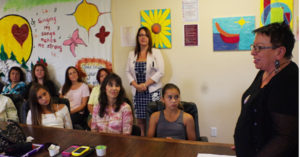Breaking Free, Breaking Through video launch creates dialogue about domestic abuse

By Rick Garrick
THUNDER BAY—The Ontario Native Women Association (ONWA) and Ontario Federation of Indigenous Friendship Centres (OFIFC) recently launched their Breaking Free, Breaking Through video to create conversation and public awareness about domestic abuse in northwestern Ontario.
“My hope is that after today’s premiere, this video will generate the conversation necessary to inspire those trapped in abusive relationships,” says Cora McGuire-Cyrette, ONWA’s executive director. “That’s our end goal here, is to create a dialogue of discussion in our communities, to begin talking about violence. It’s there; we need to talk about it, we need to acknowledge it in order to move on. We need to work together in unity in order to address this issue. It’s taken us many generations to get to this place, and only together can we as an entire community begin to address this.”
The Breaking Free, Breaking Through video documents a woman escaping a situation of family violence and accessing cultural programming and services with her daughter. The goal is to raise awareness of supports and services available for Indigenous women experiencing violence and to encourage increased dialogue about the importance of addressing high rates of violence against Indigenous women. The Breaking Free, Breaking Through video is part of ONWA and OFIFC’s Breaking Free, Breaking Through research project.
“It is our organization’s hope that this public awareness project will bring increased attention and collaborative efforts to address the safety needs of Indigenous women in Ontario and for our communities to begin to have an open dialogue on this issue,” McGuire-Cyrette says. “This is particularly timely given the recent launch of the Inquiry into [Murdered and Missing Indigenous Women].”
Magda Smolewski, research director with OFIFC, says the Breaking Free, Breaking Through research project was grounded in traditional teachings, directed by Elders and framed by an Indigenous research framework.
“At the end of the project we learned something incredible,” Smolewski says. “We learned that women’s resilience was what they say: ‘in doing culture.’”
Smolewski says the women told the researchers that they need to do culture when they gather together and share with each other.
“We then understood that what Indigenous organizations need to do is to create more spaces for Indigenous women to come together, to do culture, to practice what they want to practice and to share their experiences with each other,” Smolewski says. “Women told us this needs to happen for them to be able to heal from violence.”
Lac Seul Elder Kitty Everson says the video gave her a feeling of the trauma faced by many people in domestic violence situations.
“It’s a good thing to show to people because a lot of people don’t bring out what they suffered,” Everson says. “And they need to before they can go on without violence in their home. It just carries on if they don’t deal with it through the family.”
Brooklyn Duke, a Grade 7 Nestor Falls Public School student from Onigaming who performed as the daughter in the video, spoke out against domestic violence.
“This has to stop,” Duke says. “We’re trying to show people that we care and it has to stop.”
Jocelyn Duke, Brooklyn’s twin sister who was an extra in the video, also spoke out against domestic violence.
“It should stop and it shouldn’t happen anymore,” Jocelyn says.
Collin Graham, regional outreach and support services worker with the Ontario Aboriginal HIV/Aids Strategy, says the video was “very profound.”
“I thought the video was very powerful with its messaging,” Graham says. “I think it will create a lot of meaningful dialogue, not only within the Indigenous communities, but the entire community, especially for here in Thunder Bay because there are so many interconnections.”


